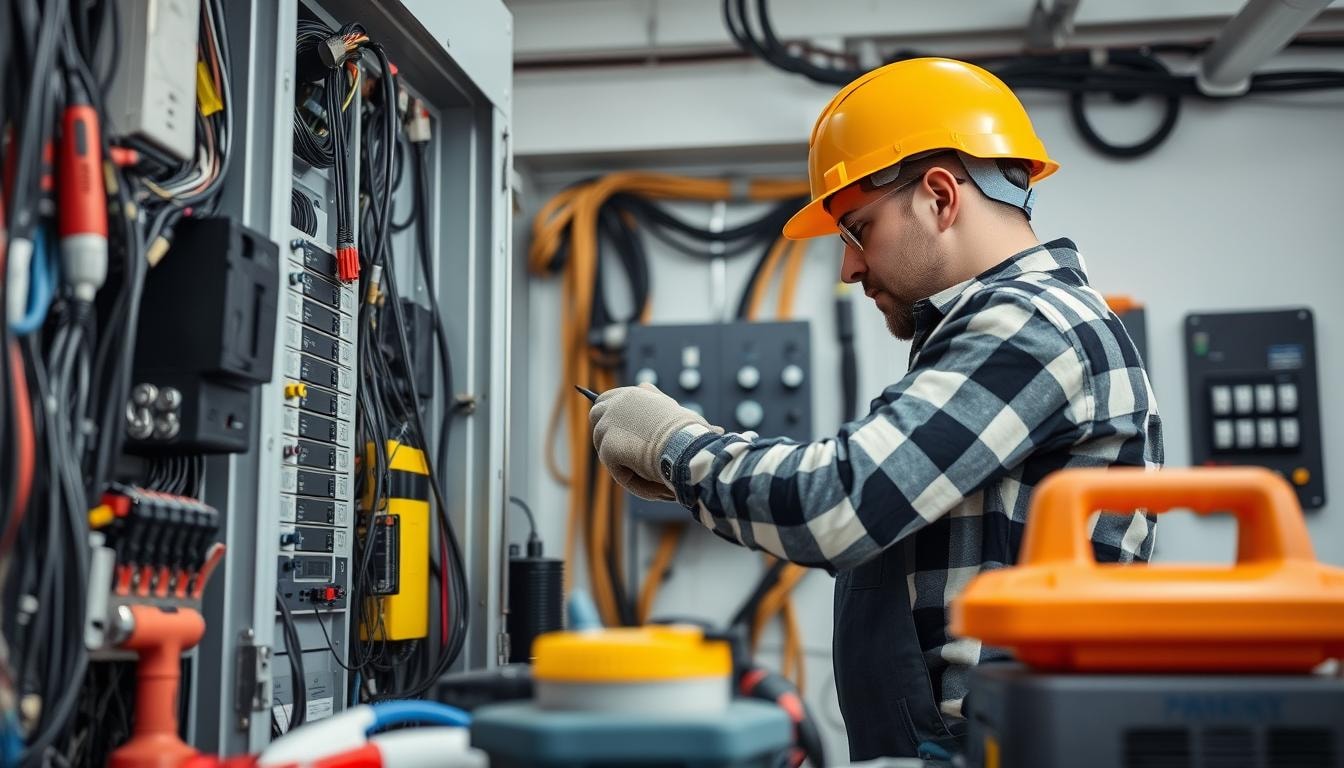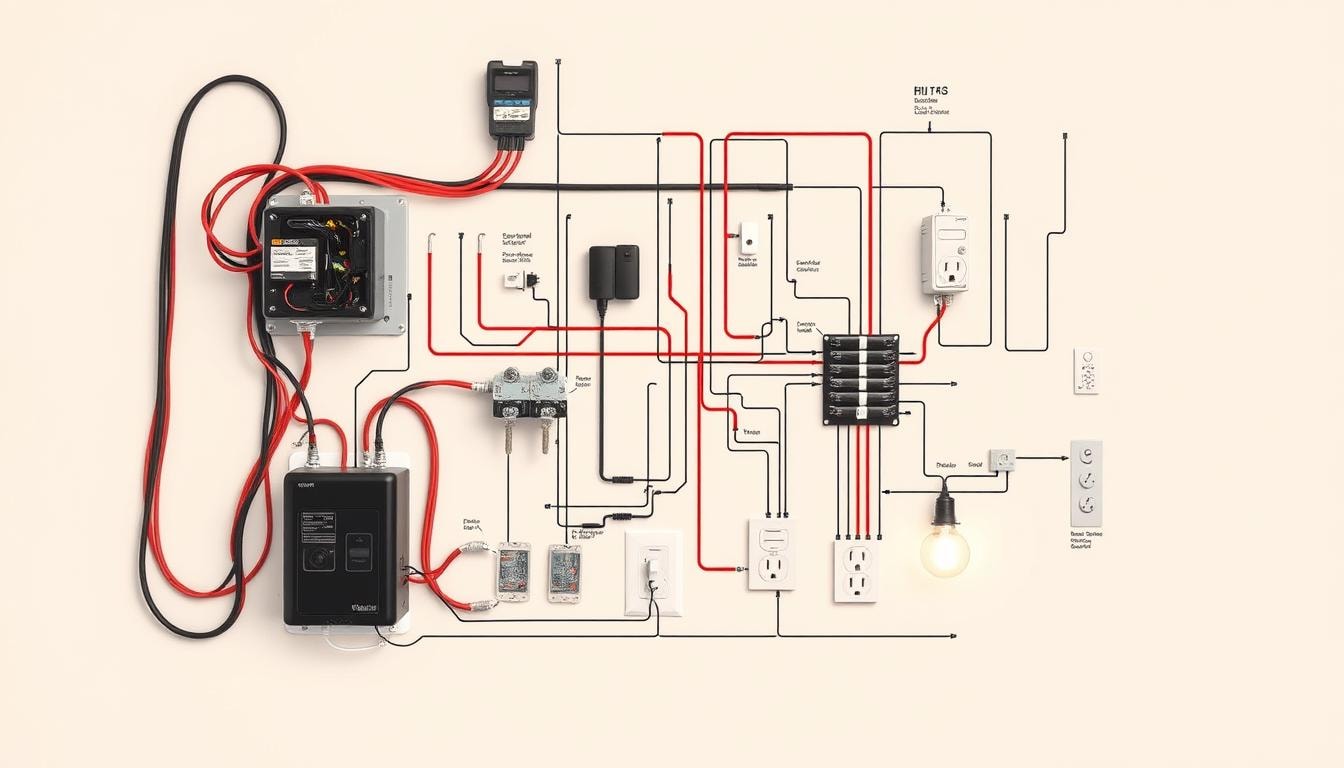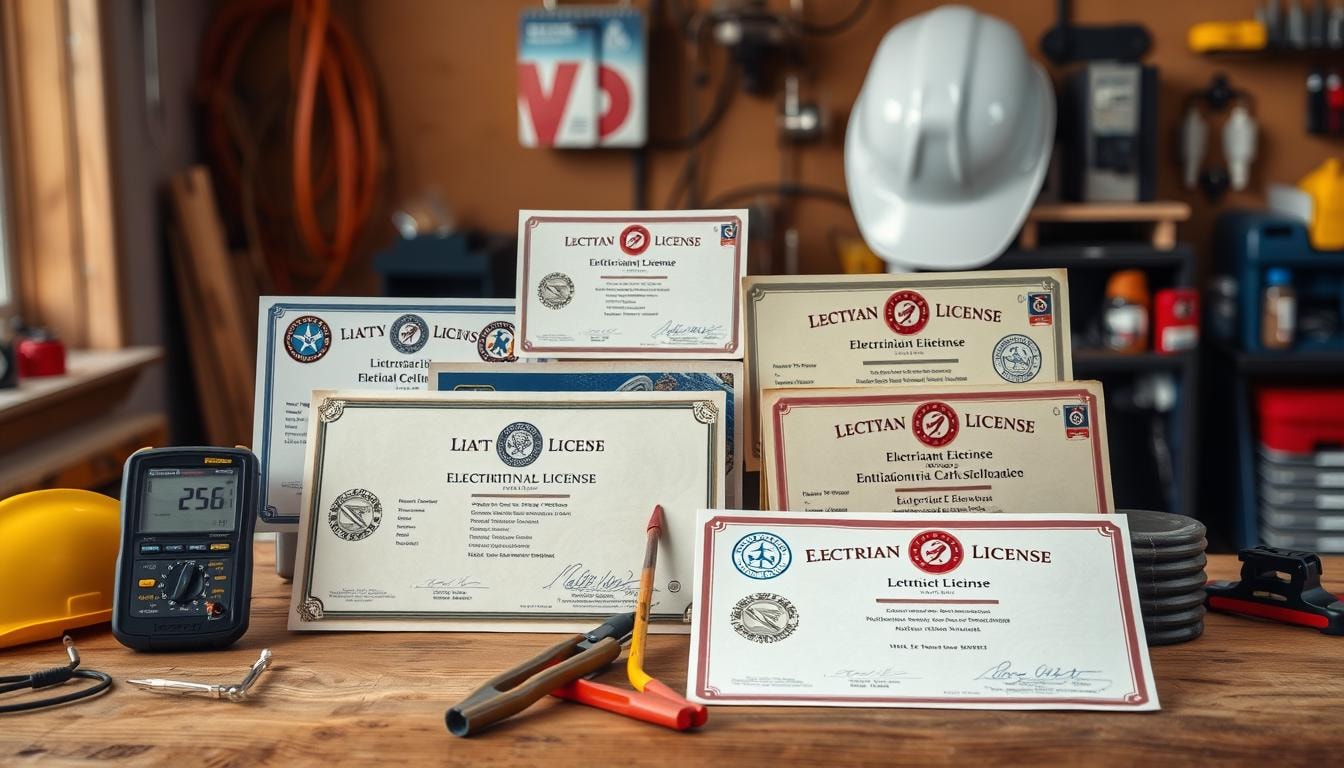Electricians Near You
Can’t find what you are looking for?
How It Works
-
Answer a few questions about your home project.
-
Within seconds, get matched with top-rated local pros.
-
Compare quotes and choose the best pro for the job.
Electricians In Your Area
Reliable Electricians: Your Guide to Hiring the Right One
Meta Description: Discover how to find and hire skilled electricians for your electrical needs. Learn about qualifications, licensing, and key factors to ensure safe, reliable service.
Finding a great electrician can be tricky. The market is full of choices. But how do you pick the best one for your needs?
Choosing the right electrician is crucial. It affects safety, efficiency, and cost. This guide will help you find the perfect match.

Key Takeaways
- Understand the importance of hiring licensed, bonded, and insured electricians to ensure safe and effective electrical work.
- Learn how to be specific about electrical issues when contacting electricians to facilitate accurate diagnostics and solutions.
- Discover the significance of checking the expertise and specialization of electricians to match the specific needs of your project.
- Recognize the value of requesting references to evaluate the reputation and reliability of electricians before hiring them.
- Appreciate the opportunity for electrical upgrades and enhancements that skilled electricians can provide for improved functionality and energy efficiency.
Signs You Need to Hire an Electrician
A safe electrical system is vital for your home’s well-being. Some signs show it’s time to call a pro electrician. Let’s look at these important indicators.
Fuses Keep Breaking
Tripped breakers and blown fuses can signal an electrical issue. These problems may come from overloaded circuits or faulty wiring. A skilled electrician can find the cause and suggest fixes.
Your Home is More Than 20 Years Old
Older homes often have outdated electrical wiring. These systems may not handle modern power needs. An expert can check your home’s electrical system and suggest updates.
Outlets Are Acting Strangely
Watch for warm outlets or those with a charred look. These signs point to electrical issues. Malfunctioning outlets can mean loose connections or other problems.
A licensed electrician should check these issues right away.
Lights Keep Flickering
Constant flickering lights may show wiring issues or loose connections. While occasional flickers are normal, ongoing problems need attention. An electrician can inspect and fix your system.
Quick action on these warning signs can prevent dangerous failures. Hiring a skilled electrician ensures your home’s wiring stays safe and works well.

Qualifications for Electricians
Electricians must meet specific qualifications to perform electrical work safely and legally. This includes vocational training, relevant experience, and obtaining necessary permits and licenses.
Vocational Training
Aspiring electricians usually complete a 3-5 year apprenticeship program. This combines classroom instruction with hands-on training. Some may attend trade schools or community college programs for electrical training.
Relevant Experience
Electricians must demonstrate on-the-job experience. For example, Alabama and Alaska require 8,000 hours of experience installing electrical wiring. Experience requirements vary by state and type of electrical work.
Required Permits
Most states require electricians to be licensed. There are different levels of certification, such as journeyman and master electrician. Obtaining permits and licenses ensures compliance with regulations, codes, and safety standards.

Before hiring an electrician, check their credentials. This includes their license, insurance, and worker’s compensation coverage. Ensure they meet qualifications to safely and legally perform your project.
Electrical Career Levels
The electrical field offers various career paths with different responsibilities and requirements. Understanding these levels can help you choose the right electrician for your project. Let’s look at the three main levels: apprentice, journey-level, and master.
Apprentice
Apprentice electricians are beginners working under licensed electricians. They gain hands-on experience and learn essential trade skills. Apprentices usually complete a 4- or 5-year training program.
This includes 2,000 hours of paid training each year. They also receive instruction in electrical theory and safety practices.
Journey-Level
Journey-level electricians have finished their apprenticeship and can work independently. They’re certified for commercial, industrial, and specialty electrical work. This certification requires thousands of training hours and extensive field experience.
These professionals can handle various projects. Their work ranges from power tools installation to lightning protection.
Master
Master electricians are the most experienced in the field. They need at least 4,000 hours of experience as journey-level electricians. These experts have deep knowledge of electrical theory and complex problem-solving skills.
They can supervise and train other electrical workers. Hiring a master electrician ensures top-notch work on any project. This includes designated partitions, air conditioning, or other electrical systems.
Common Services Electricians Offer
Skilled electricians handle various electrical projects in homes and businesses. They work on lighting, outlet repair, wiring upgrades, and electrical panel maintenance. Their expertise ensures safe work that complies with building codes.
Electricians typically provide these services:
- Installing, repairing, and replacing light fixtures, switches, and outlets
- Upgrading or replacing electrical panels and circuit breakers
- Rewiring homes and businesses, including concealed areas
- Inspecting and testing electrical components to identify and fix issues
- Installing and maintaining security systems, intercom systems, and other electrical systems
- Connecting and hooking up household appliances, HVAC units, and other electrical equipment
- Providing 24/7 emergency services for urgent electrical problems
Electrical contractors ensure safe and efficient components in your home or business. Their training and experience cover building regulations and electrical systems. They can handle routine maintenance, complex projects, and urgent repairs.
Hiring an Electrician: Tips and Questions
Ensure your electrician has proper licenses, insurance, and permits. Describe your electrical issues clearly for an accurate assessment. Check their expertise to match your project needs.
Make Sure They Have the Right Qualifications
Look for electricians with vocational training and proper licenses. Verify they have necessary permits and insurance. This protects your home and ensures compliance with local regulations.
Be Specific About Your Problems
Clearly explain your electrical issues or upgrade needs. Detailed information helps electricians assess the situation accurately. This leads to reliable estimates for the required work.
Check Expertise
Evaluate the electrician’s skills and experience. Make sure they match your specific needs. This applies to electrical wiring, air conditioning, or other components.
Evaluating and Comparing Electricians
Hiring the right electrician is vital for safe and efficient electrical systems. Consider these key factors to make an informed decision. They’ll help you find the best professional for your needs.
Request References
Ask for references from past clients to assess an electrician’s work quality. Contact these references to learn about their experiences. This provides insights into the electrician’s skills and customer service.
You’ll gain knowledge about their handling of building regulations and equipment. References can reveal how well they work with intercom systems and tools in concealed areas.
Always Ask for an Estimate
Request a detailed estimate outlining the work scope, timeline, and cost. This helps you understand what you’re paying for and ensures fair pricing. Compare estimates from multiple contractors to get the best value for your project.
By following these steps, you can confidently evaluate and compare electricians. You’ll be able to hire a skilled professional who meets all safety and building codes.
Get to Know the Electrician’s Team
Understanding the team working on your electrical project is crucial. Ask about the crew members and their expertise. This helps ensure you have qualified professionals handling your home’s electrical work.
An electrician’s team includes apprentices, journeymen, and master electricians. Apprentices are trainees learning under supervision. Journeymen are skilled workers who’ve finished their apprenticeship. Master electricians are the most experienced, overseeing projects and maintaining high standards.
Knowing the team’s qualifications gives you confidence in your project. Experienced workers use power tools and apply electrical theory knowledge. They also prioritize safety in all tasks.
This expertise is vital for complex jobs like lightning protection technician work. It’s also important for installing air conditioning systems. These projects need proper designated partitions and electrical wiring skills.
Ask about the team’s composition and individual qualifications. This helps you make an informed choice. You’ll ensure your project is handled by a capable and reliable crew.
Questions to Ask When Hiring Electricians
Finding a reliable electrician is crucial for your electrical needs. Asking the right questions helps you choose a qualified professional. Here are key questions to consider when hiring an electrician:
- What services do you provide? Ask about their expertise in heating protection, street lights, and air conditioning. This ensures they have the right skills for your project.
- Are you licensed and insured? Check if they have proper licensing and insurance. This is important for safe maintenance of electrical systems.
- How long has your company been in business? An experienced electrician with a long-standing business is more likely to provide reliable services.
- What is your experience level? Inquire about their training, certifications, and types of electrical systems they’ve worked on.
- Can you provide references? Contact previous clients to understand the electrician’s professionalism and work quality.
- What is the cost estimate? Ask about the total cost, including equipment and materials. Inquire about potential additional charges that may arise.
- What is the timeline for this project? Get estimated start and completion dates. Ask about possible disruptions to electrical service during work.
These questions help you find a knowledgeable and experienced electrician. A thorough vetting process can prevent potential issues later on.
It ensures your electrical project is completed to your satisfaction. Remember, choosing the right electrician is key to safe and reliable electrical services.
Find Reliable Electricians with FindPros
Trying to find the right electrician for your home or business project can be daunting. That’s where FindPros comes in. With our service, you can quickly get matched with top-rated local electricians, whether you need an industrial electrician, interior electrician, or someone to install, maintain, and repair your electrical systems.
Just answer a few simple questions about your project, and we’ll connect you with pros that fit your needs and budget. They’ll compete for your job, ensuring you get the best pricing. Plus, you can review their credentials, qualifications, and customer feedback to find the perfect match. Take the stress out of scheduling electrical work and ensure conformance with all relevant codes and regulations by using FindPros today.
Conclusion
Hiring a licensed and experienced electrician is crucial for any home electrical project. They ensure your home’s electrical system is safe and functioning properly. Finding a reliable professional involves understanding when to hire one and what qualifications to look for.
Electricians maintain safety and efficiency in residential and commercial settings. They follow strict regulations to prevent hazards, fires, and accidents. Their skills range from installing intercoms to replacing wiring in concealed areas.
Hiring a professional with expertise and on-the-job experience is essential. They should be committed to upholding electrical and safety codes. This ensures your electrical systems are in capable hands.
A well-functioning electrical system provides comfort, convenience, and safety. Professional electricians can handle routine inspections, complex renovations, and emergency repairs. Their work gives you peace of mind about your home or business’s electrical systems.
Frequently Asked Questions (Electricians)
MOST POPULAR CITIES
Browse by State- Alameda
- Costa Mesa
- Laguna Beach
- Orange
- Alhambra
- Culver City
- Lancaster
- Oroville
- Anaheim
- Daly City
- Livermore
- Oxnard
- Antioch
- Davis
- Lodi
- Pacific Grove
- Arcadia
- Downey
- Lompoc
- Palm Springs
- Bakersfield
- El Centro
- Long Beach
- Palmdale
- Barstow
- El Cerrito
- Los Angeles
- Palo Alto
- Belmont
- El Monte
- Malibu
- Pasadena
- Berkeley
- Escondido
- Martinez
- Petaluma
- Beverly Hills
- Eureka
- Marysville
- Pomona
- Brea
- Fairfield
- Menlo Park
- Port Hueneme
- Buena Park
- Fontana
- Merced
- Rancho Cucamonga
- Burbank
- Fremont
- Modesto
- Red Bluff
- Calexico
- Fresno
- Monterey
- Redding
- Calistoga
- Fullerton
- Mountain View
- Redlands
- Carlsbad
- Garden Grove
- Napa
- Redondo Beach
- Carmel
- Glendale
- Needles
- Redwood City
- Chico
- Hayward
- Newport Beach
- Richmond
- Chula Vista
- Hollywood
- Norwalk
- Riverside
- Claremont
- Huntington Beach
- Novato
- Roseville
- Compton
- Indio
- Oakland
- Sacramento
- Concord
- Inglewood
- Oceanside
- Salinas
- Corona
- Irvine
- Ojai
- San Bernardino
- Coronado
- La Habra
- Ontario
- San Clemente